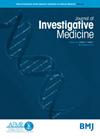Long-term modification of gut microbiota by broad-spectrum antibiotics improves stroke outcome in rats
IF 2.6
1区 医学
引用次数: 6
Abstract
Background The brain-gut axis is a major regulator of the central nervous system. We investigated the effects of treatment with broad-spectrum antibiotics on gut and brain inflammation, infarct size and long-term behavioral outcome after cerebral ischemia in rats. Methods Rats were treated with broad-spectrum antibiotics (ampicillin, vancomycin, ciprofloxacin, meropenem and metronidazole) for 4 weeks before the endothelin-1 induced ischemia. Treatment continued for 2 weeks until the end of behavioral testing, which included tapered ledged beam-walking, adhesive label test and cylinder test. Gut microbiome, short-chain fatty acids and cytokine levels were measured together with an assessment of infarct size, neuroinflammation and neurogenesis. Results The results revealed that the antibiotics exerted a clear impact on the gut microbiota. This was associated with a decrease in systemic and brain cytokine levels, infarct size and apoptosis in the perilesional cortex and improved behavioral outcome. Conclusion Our results highlighted the significant relationship between intestinal microbiota and beneficial neuro-recovery after ischemic stroke.广谱抗生素长期改变肠道微生物群可改善大鼠脑卒中预后
背景脑肠轴是中枢神经系统的主要调节因子。我们研究了广谱抗生素治疗对大鼠脑缺血后肠道和大脑炎症、梗死面积和长期行为结果的影响。方法在内皮素-1诱导大鼠缺血前用广谱抗生素(氨苄青霉素、万古霉素、环丙沙星、美罗培南和甲硝唑)治疗4周。治疗持续2周,直到行为测试结束,包括锥形梁行走、粘贴标签测试和圆柱体测试。测量肠道微生物组、短链脂肪酸和细胞因子水平,同时评估梗死面积、神经炎症和神经发生。结果抗生素对肠道微生物群有明显的影响。这与系统和大脑细胞因子水平、梗死面积和病变周围皮层细胞凋亡的降低以及行为结果的改善有关。结论我们的研究结果强调了肠道微生物群与缺血性卒中后有益的神经恢复之间的重要关系。
本文章由计算机程序翻译,如有差异,请以英文原文为准。
求助全文
约1分钟内获得全文
求助全文
来源期刊

Journal of Investigative Medicine
MEDICINE, GENERAL & INTERNALMEDICINE, RESE-MEDICINE, RESEARCH & EXPERIMENTAL
自引率
0.00%
发文量
111
期刊介绍:
Journal of Investigative Medicine (JIM) is the official publication of the American Federation for Medical Research. The journal is peer-reviewed and publishes high-quality original articles and reviews in the areas of basic, clinical, and translational medical research.
JIM publishes on all topics and specialty areas that are critical to the conduct of the entire spectrum of biomedical research: from the translation of clinical observations at the bedside, to basic and animal research to clinical research and the implementation of innovative medical care.
 求助内容:
求助内容: 应助结果提醒方式:
应助结果提醒方式:


